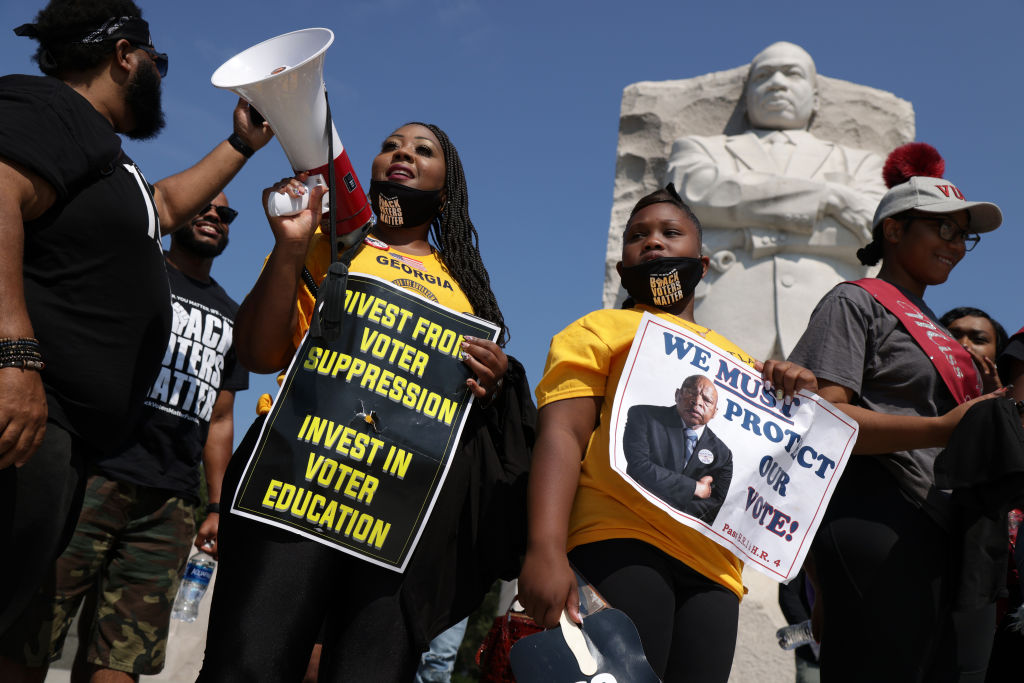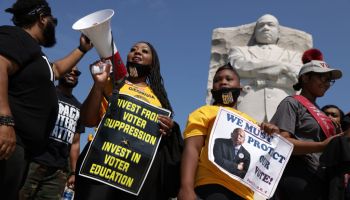
Activists demonstrate for voting rights on the 56th anniversary of the Voting Rights Act Source: Alex Wong / Getty
We owe it to local organizers and legal advocates to show up in the fight for voting rights and protections for Black voters, especially on the anniversary of the Voting Rights Act. With the 2022 midterm elections on the horizon, the rallying cry of “get out the vote!” has many of us feeling jaded.
Let’s get real for a second. Two years into the Biden administration, there has been no sense of recovery, and very little has felt like progress. We are deep into the third year of the COVID-19 pandemic, with monkeypox cases rising and polio making a grand re-entrance on the public health scene.
The present moment looks bleak. We are deep into the chaotic breakdown of the social, political, and economic systems already failing to meet the needs of disproportionately under-resourced Black communities. In this environment, it’s not easy to drum up enthusiasm for a political process that rarely delivers on its promises of a fair and equitable civic life.
Yet here we are, on the 57th anniversary of the Voting Rights Act, still fighting for “free and fair elections.” Despite that reality, we’ve got plenty of progress to celebrate today – and a clearer path forward for future generations.
Local Focus with National Impact
While the tried and true tactics of canvassing, phone banking, direct mail campaigns and now peer-to-peer texting are still the main outreach tools for many organizations, the most effective strategies for engaging voters to start with local organizing. Locally-led grassroots efforts have fought long and hard for communities that are too often overlooked by national campaigns that pour resources into a select few states every election cycle.
But many of the most recent progressive wins and red-to-blue upsets have been delivered by organizations in rural, southern and historically conservative districts and regions across the U.S. Georgia has been on our collective mind since Stacey Abrams began her historic run for governor in the 2018 midterm elections.
While the South was mainly being dismissed as a lost cause for (white) progressives, Black organizers seized the momentum of national interest to increase civic engagement at the local level significantly. The New Georgia Project revived the playbook on innovating Southern outreach strategies. At the same time, Fair Fight Action leveraged the legal fight against voter suppression to catapult the growth of Black-led grassroots activism in Georgia.
Their organizing models have been reproduced and deployed across the country, with nonprofits like the New North Carolina Project training and mobilizing organizers to increase voter turnout with Black and Brown voters. While these organizations run major statewide and multi-state programs, fieldwork is accomplished through partnerships and collaboration with volunteer-led, community-funded, and independent coalition-based efforts.
Groups like the Indivisible Georgia Coalition and 159 Georgia Together sustain year-round campaigns dedicated to voter education, keeping locals informed about issues such as Georgia’s far-reaching SB202 election law.
Pennsylvania has similarly produced a strong cohort of organizations that infuse new life into the voter engagement landscape. Based in southwestern Pennsylvania, 1Hood Media has created a platform that leverages new media to inspire and mobilize marginalized communities.
By hosting commentary news segments like “This Week in White Supremacy” and informative town halls featuring local experts and legislators, 1Hood Media raises awareness of social justice issues impacting Black communities in the region.
Make the Road PA, Pennsylvania United and Pennsylvania Stands Up have built the infrastructure that supports hundreds of organizers across more than a dozen chapters and growing. From successfully campaigning for progressive ballot measures to fighting voter suppression through redistricting, these powerhouses build local power through trusted, authentic homegrown networks of volunteers and chapter members.
On the national front, capacity-building projects from Black Voters Matter and Woke Vote have mobilized thousands of underserved predominantly Black communities by meeting them where they are and deploying resources year-round. These Black-led and Black-serving organizations have already reshaped the political landscape with a focus on leadership development, organizer training and resource accessibility.
Trusting the Process of Progress
When we draw it all together, hundreds of thousands of local volunteers have now been trained as political strategists, informed by the values of global social justice movements. We rely on these emerging leaders to build boots-on-the-ground teams wherever they call home.
If you’re still ambivalent about the process of making progress, the latest move against voter suppression can change what it means to vote for all of us. On July 11, 2022, a few weeks before the VRA’s 57th anniversary, Sen. Elizabeth Warren and Rep. Nikema Williams introduced the Youth Voting Rights Act proposal. This bill includes comprehensive legislation to enforce the 26th Amendment and expand youth access to voting.
The Youth Voting Rights Act would significantly increase youth voting rates by removing many current institutional and structural barriers to access. Several youth-focused organizations such as NextGen America, The Andrew Goodman Foundation, ALL IN Campus Democracy Challenge, When We All Vote, the Fair Elections Center’s Campus Vote Project and Students Learn Students Vote endorse the Youth Voting Rights Act.
This year, more than 8.3 million youth will become eligible voters, and nearly half are youths of color, making this age group one of the most diverse groups to enter the electorate. The future looks pretty brilliant from where I’m standing. We’ve only just begun to see the powerful influence of young voters, who may soon become the most impactful electoral demographic in key states.
This is a small sample of what’s on the horizon and what’s at stake for vote-focused advocacy. Voting rights and accessibility touch every issue and every community.
Yet, organizers continue to offer us new ways to expand our civic engagement in ways that meet us where we are. Their work reminds us that collective power is built through sustained effort, and we are all invited to contribute. How, when, and where you show up in the process is up to you.
Niq Johnson, Ph.D. is a senior advisor at Action Together Network and co-founder of Keyframe Illumination.
SEE ALSO:
Justice Department Sues Arizona Over ‘Textbook Violation’ Of Voting Rights
The post OP-ED: Voting Rights Fight Requires Trust In The Process Of Progress appeared first on NewsOne.
OP-ED: Voting Rights Fight Requires Trust In The Process Of Progress was originally published on newsone.com

















